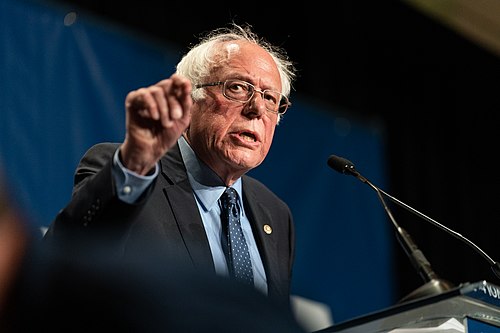From The Nation
Instead of accepting Trump's trade deal and compromises on saving the planet, Sanders said in Tuesday's debate, "We need some corporate responsibility here."
Bernie Sanders
(Image by (From Wikimedia) Lorie Shaull from St Paul, United States, Author: Lorie Shaull from St Paul, United States) Details Source DMCA
I was in Seattle in 1999 for the protests against the World Trade Organization and the failed trade policies of the 20th century. And for a moment it seemed as if the divisions between activists that had too frequently allowed corporatists to get their way with the economy and the planet were being overcome. Teamsters and turtles -- trade unionists fighting for jobs and activists dressed as threatened species to highlight environmental concerns -- marched in solidarity.
Maybe the 21st century could be different.
Or maybe not.
At the Democratic presidential debate on Tuesday in Des Moines, the candidates had a spirited discussion of trade policy in general and the Trump administration's United States Mexico Canada Agreement (USMCA) in particular. Faced with a line of questioning that encouraged them to compromise away the future in order to achieve some modest gains in the moment, most accepted the latest variation on the old "free trade" calculus.
But Bernie Sanders refused to play the game.
"The Senate will likely soon approve a new trade deal with Mexico and Canada, Iowa's largest trading partners," said Brianne Pfannenstiel of The Des Moines Register. "Senator Sanders, you have said that new deal, the USMCA, quote, 'makes some modest improvements,' yet you are going to vote against it. Aren't modest improvements better than no improvements..."
"No," replied the senator from Vermont, who explained:
"The answer is we could do much better than a Trump-led trade deal. This deal -- and I think the proponents of it acknowledge -- will result in the continuation of the loss of hundreds of thousands of good-paying jobs as a result of outsourcing.
"The heart and soul of our disastrous trade agreements -- and I'm the guy who voted against NAFTA and against permanent normal trade relations with China -- is that we have forced American workers to compete against people in Mexico, in China, elsewhere, who earn starvation wages, $1 or $2 an hour.


